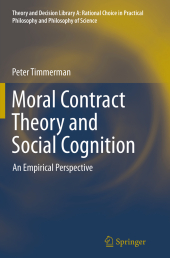 Neuerscheinungen 2016Stand: 2020-02-01 |
Schnellsuche
ISBN/Stichwort/Autor
|
Herderstraße 10
10625 Berlin
Tel.: 030 315 714 16
Fax 030 315 714 14
info@buchspektrum.de |

Peter Timmerman
Moral Contract Theory and Social Cognition
An Empirical Perspective
Softcover reprint of the original 1st ed. 2014. 2016. x, 233 S. 7 SW-Abb., 8 Tabellen. 235 mm
Verlag/Jahr: SPRINGER, BERLIN; SPRINGER INTERNATIONAL PUBLISHING 2016
ISBN: 3-319-35326-8 (3319353268)
Neue ISBN: 978-3-319-35326-5 (9783319353265)
Preis und Lieferzeit: Bitte klicken
This book reveals that certain crucial, yet controversial, assumptions of moral contract theory are in fact plausible in the light of empirical findings. Its novel approach resolves a number of key contingencies in contractarianism and contractualism.
This interdisciplinary work draws on research from psychology and behavioral economics to evaluate the plausibility of moral contract theory. In a compelling manner with implications for moral theory more broadly, the author´s novel approach resolves a number of key contingencies in contractarianism and contractualism.
Acting in accordance with principles that we could all agree to under certain conditions requires that agents are capable of taking up the perspectives of others. Research in social and developmental psychology shows just how challenging this can be. The author discusses in detail what implications findings on perspective-taking have for contract theory. He concludes with cautious optimism that, despite our limitations, it lies within our power to become better at perspective-taking and to adopt a contractarian or contractualist mode of moral thinking. This does however require us to be much more attentive to the standpoints of others than we tend to be.
Contract theorists also assume that agents can be moved to comply with principles that would be the object of agreement, with some arguing they can be so moved out of their own interest. The book show that, in contrast to the suspicion of many philosophers, this idea is largely supported by research on the dynamics of trust and our ability to distinguish trustworthy from untrustworthy others. Bringing a welcome dose of realism to the debate on contract theory, the author shows the value of assessing moral theories from an empirical perspective.
Acknowledgements.- I Introduction.- 1 The Practicability Assumption.- 2 Contract Theory and Perspective-Taking.- 3 Perspective-Taking in Moral Judgment.- 4 Perspective-Taking Accuracy and the Contract Test.- 5 How to Use a Contract Test.- II The Translucency Assumption.- 6 Contract Theory and Translucency.- 7 Translucency and the Irrationality of Straightforward Maximization.- 8 Why Not Be an Opportunist?.- 9 When Constrained Maximization is Rational.- 10 Conclusions.- Appendix.- Index.


